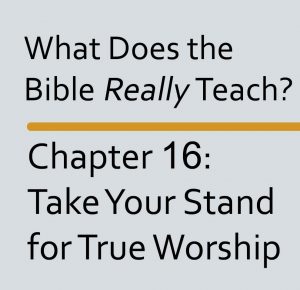Chapter 15 of “Bible Teach” told you that you need to get out of Babylon the Great.
Chapter 16, “Take Your Stand for True Worship”, says that’s not enough.
You also need to get Babylon the Great out of you!
Paragraphs 1-2 (p. 154) compare false religion to poison and warn that it “is contaminated with unclean teachings and practices.”
“Unclean teachings”
Paragraph 3 (p. 155) says that you need to get rid of shrines and images that you may use in worship. An accompanying photo includes a picture of a cross.
I discussed the cross in connection with Chapter 5 and the related appendix, “Why True Christians Do Not Use the Cross in Worship” (p. 204). If necessary you can review and remind the Witnesses of what you said then.
You should also make the point that whether or not an object is an idol depends on what’s in the mind and the heart of the person involved, and that they shouldn’t look judge other people or condemn them as idolaters.
Paragraph 4 (pp. 156) repeats the teaching from Chapter 6 and Chapter 7 that the dead are conscious of nothing. Consider whether you need to repeat or reinforce any of the things I suggested you discuss at that time.
“Unclean practices”
Paragraphs 6-8 (pp. 156-157) introduce the Watchtower’s insistence that Christians must not celebrate birthdays.
Paragraph 6 (p. 156) states that for two centuries Christians didn’t care about the exact date of Jesus’ birth.
Paragraph 7 (p. 157) says they wouldn’t have celebrated it anyway, citing The World Book Encyclopedia to the effect that “the early Christians ‘considered the celebration of anyone’s birth to be a pagan custom.’” It goes on to say that the only birthday observances mentioned in the Bible are those of two rulers who did not worship Jehovah. Moreover, birthday celebrations were also held in honor of pagan deities such as Diana and Apollo.
Paragraph 8 (p. 157) argues that Jesus’ disciples “likely knew that birthday celebrations were connected with superstition,” such as Greeks and Romans believing that a spirit attended people’s births and protected them throughout their lives.
I recommend that you respond using The Christian Freedom Approach from my book, Getting Through to Jehovah’s Witnesses: Approaching Bible Discussions in Unexpected Ways, pp. 232-236, which covers both birthdays and holidays.
Ask the Witnesses to read aloud the key Scripture—Romans 14:5, 10: “One man judges one day as above another; another judges one day the same as all others; let each one be fully convinced in his own mind…. But why do you judge your brother? Or why do you also look down on your brother? For we will all stand before the judgment seat of God.”
I would add, “If your conscience tells you not to celebrate certain days because of what they supposedly meant to some pagans thousands of years ago, then don’t celebrate them. The verses we just read say that we shouldn’t judge each other based on what days we do or don’t celebrate. But it seems to me that the Watchtower does pass judgment on such things and leads you to believe that your behavior is more acceptable to God than mine. Given that the Bible says this is a conscience matter, why does the Watchtower require all Jehovah’s Witnesses to think and act alike?”
You might add, “Luke 2:1-12 says that the angels announced Jesus’ birth to the shepherds with great joy and celebrated. Since the holy angels celebrated the birth of Jesus, why can’t I?”
Paragraph 9 (pp. 157-158) argues that Jesus wasn’t really born on December 25 and that the date was chosen because it was the date of a Roman sun festival. It then refers you to an appendix entitled, “Was Jesus Born in December?” (p. 221).
That appendix argues that the weather conditions in December would have precluded the shepherds from tending their flocks at that time (p. 222).
To that, I would respond, “Let me get this straight. If I celebrate Jesus’ birth on his actual birthday, I’m engaging in paganism, but if I celebrate it on a different day, then I’m in error because I have the wrong date. That doesn’t make sense to me.”
Page 222 makes this statement: “This brings to mind King Solomon’s words: ‘A good name is better than good oil, and the day of death is better than the day of birth.’ (Ecclesiastes 7:1) It is not surprising, then, that the Bible provides many details about Jesus’ ministry and death but few details about the time of his birth.”
My reply to that is, “That seems to me to be an out-of-context use of an extremely pessimistic statement in Ecclesiastes!” In an earlier post, I discussed the importance of interpreting Ecclesiastes in context rather than using isolated verses as proof texts. You could go into that with the Witnesses at this juncture, or you could simply inject humor by asking, “Does that mean we should throw parties on anniversaries of our loved ones’ deaths rather than on anniversaries of their births?”
Paragraph 10 (pp. 158-159) also refers you to an appendix entitled, “Should We Celebrate Holidays?” (p. 222)
The appendix (p. 223) argues that Easter celebrations rooted in pagan fertility rites.
It sees New Year’s celebrations as being connected to the false Roman god, Janus (p. 223).
Halloween? That’s an offshoot of the Druid festival of the dead (p. 224).
Returning to Chapter 16 itself, in paragraph 10 (pp. 158-159) “Bible Teach” summarizes these matters by saying, “those who want to please God do not celebrate [Christmas] or any other holiday that has its roots in pagan worship.”
I have discussed these topics further in The Christian Freedom Approach (pp. 232-236) from my book.
Next week, we’ll look more deeply into the issue of pagan origins of various practices.


Leave a Reply
Be the First to Comment!